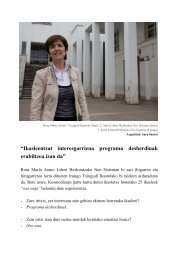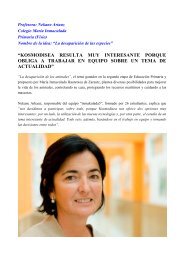Final Report of the Expert Group - European Commission - Europa
Final Report of the Expert Group - European Commission - Europa
Final Report of the Expert Group - European Commission - Europa
Create successful ePaper yourself
Turn your PDF publications into a flip-book with our unique Google optimized e-Paper software.
1. Students (age 16) participate in <strong>the</strong> Young Enterprise student company programme in <strong>the</strong>irsecond class. (Learning by doing). In <strong>the</strong> programme, achievers set up and run <strong>the</strong>ir owncompany throughout one academic year. They elect a board <strong>of</strong> directors from amongst <strong>the</strong>irpeers, raise share capital, and market and finance a product or service <strong>of</strong> <strong>the</strong>ir own choice.They deal with real money, produce real products, and take part in trade fairs. At <strong>the</strong> end <strong>of</strong><strong>the</strong> year <strong>the</strong>y liquidate <strong>the</strong> company and present a report and accounts.2. The next step takes place through <strong>the</strong>oretical business studies. (age 17-18)3. Students participate in a Practice Firm (age 19) to acquire special vocational knowledge.The training method involves a room <strong>of</strong> a suitable size and up-to-date technical equipment aswell as a fictitious enterprise. The training provided supplements and deepens <strong>the</strong>oreticalknowledge, providing opportunities for <strong>the</strong> most practical learning and simulation <strong>of</strong> <strong>the</strong>world <strong>of</strong> commerce and business activities. Activities are directly or indirectly related to <strong>the</strong>operation <strong>of</strong> an actual enterprise. The <strong>of</strong>fice has established a relationship with <strong>the</strong> enterpriseon which <strong>the</strong> fictitious one is modelled and <strong>the</strong> model <strong>of</strong>fice is copying its operations, usingits business documents etc.4. <strong>Final</strong>ly, <strong>the</strong> school has an incubator-house and programme, giving students <strong>the</strong> possibilityto develop <strong>the</strong>ir own real business.Contact:Business Polytechnicwww.poli.hu3.7. Junior Achievement Student Company Programme (Estonia)The student company programme is <strong>of</strong>fered by Junior Achievement Estonia. Participants arehigher secondary school students, mostly age 16-18, but also from lower secondary school(age 13-15). The programme is developed for not more than one school year, and normallyruns for five months. Students work under <strong>the</strong> supervision <strong>of</strong> a consultant or (more <strong>of</strong>ten) ateacher who has received training in facilitating student companies.A student company may involve <strong>the</strong> whole class <strong>of</strong> students (rarely) or smaller groups (3-7persons). Students decide upon <strong>the</strong> product or service, choose <strong>the</strong>ir managers and sell sharesto raise capital. They produce or order <strong>the</strong> product made to <strong>the</strong>ir design. They sell <strong>the</strong> productand keep accounts. During <strong>the</strong> school year, students participate in local and national studentcompany trade fairs. At <strong>the</strong> end <strong>of</strong> <strong>the</strong> period <strong>the</strong>y present a report to JA Estonia.Schools and teachers are prepared by Junior Achievement Estonia. The first step is initialtraining <strong>of</strong> teachers in <strong>the</strong> methodology <strong>of</strong> teaching and facilitating student companies. Afterthat, advanced training is regularly <strong>of</strong>fered. Also, permanent advice is given to schools andteachers using <strong>the</strong> student company programme by specialists <strong>of</strong> Junior Achievement Estonia.In training sessions, <strong>the</strong> specific competence <strong>of</strong> business people and universities is used.Learning materials have been developed by Junior Achievement Estonia to be used bystudents and by teachers.A great source <strong>of</strong> business volunteers is alumni who have graduated from <strong>the</strong> programme andcome back to support teachers. A new programme has been started to teach <strong>the</strong>m how tobecome junior advisors for younger ones at schools. Through this programme a dual benefiteffect is expected: for student companies, who get fresh experience and excitement from <strong>the</strong>irpeers and also for older students, who get <strong>the</strong>ir first teaching experience.25




